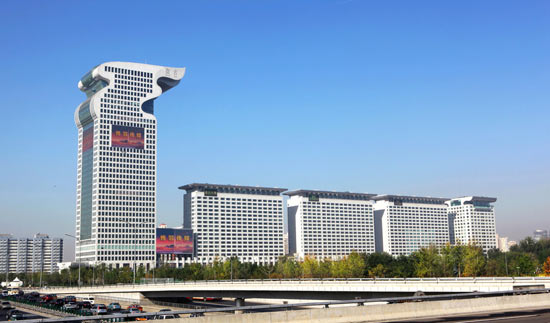
Zhoukou City has a population of 12 million and has been dubbed the "barn in the east of Henan Province" for its grain production that accounts for about one-seventh of the provincial total, which is about one-tenth of the national total.
But, as most villagers are influenced by traditional Chinese culture, which highlights an elaborate funeral process and burial for their deceased ancestors, more than 3.5 million tombs had been built in the farmland across the city. Also, due to limited investment in public cemeteries, the tombs in the farmland have increased by about 70,000 per year, according to sources with the Zhoukou municipal government.
As scattered burial mounds in the region have severely eroded the farmland and hindered the mechanization of farming, the Zhoukou municipal government issued a statement in 2012 to promote city-wide burial reform.
According to the statement, cremation is encouraged and 3,130 public cemeteries will be built, offering free graves and management services.
More than 2 million tombs dotting the farmland were relocated or razed last year.
However, some 100,000 burial mounds removed in the funeral reform campaign were secretly rebuilt during the Spring Festival in February, accounting for about 7.7 percent of those that were removed, according to the Civil Affairs Bureau of Zhoukou.
It is a commonly held belief in China that a good location for ancestors' tombs can bring good luck and happiness to living relatives, but damaging tombs can spell disaster. This theory has made it taboo to dig up the tombs of others' ancestors in traditional Chinese culture.
Though the relocation campaign triggered social concerns that highlight the conflict between preserving farmland and upholding cultural traditions, most local residents understand and support the burial reform.
"Although I support tomb relocation, because tombs in the farmland may hamper mechanized farming, I still rebuilt my ancestors' tombs during the Spring Festival. Otherwise, my neighbors who rebuilt their removed tombs would laugh at me and think I did not respect my ancestors," said Jin Degui, a resident of Sihouliu Village, Xihua County.
Referring to some netizens' criticisms of the relocation reform, Jin said they were not farmers, so they could not understand the tombs' impact on farming.
"It really takes time to change traditional beliefs," Jin's son Jin Guanghua said, adding that more public cemeteries should be built to encourage villagers to relocate tombs.
Meanwhile, people from Zhoukou who have relocated for work are feeling surges of homesickness ahead of the upcoming Tomb-Sweeping Day.
They have paid their respects to, and shown their love for, their deceased families via posts on Sina Weibo, China's Twitter-like microblogging platform.
"My father's tomb in my hometown Zhoukou was flattened. As the Tomb-Sweeping Day approaches, I feel pain, because I can not find somewhere to honor my beloved Daddy," Li Donghong, a journalist with the province's Henan Daily, wrote in a post.

















 Heavy rainfall hits S China's Guangxi
Heavy rainfall hits S China's Guangxi


![]()
